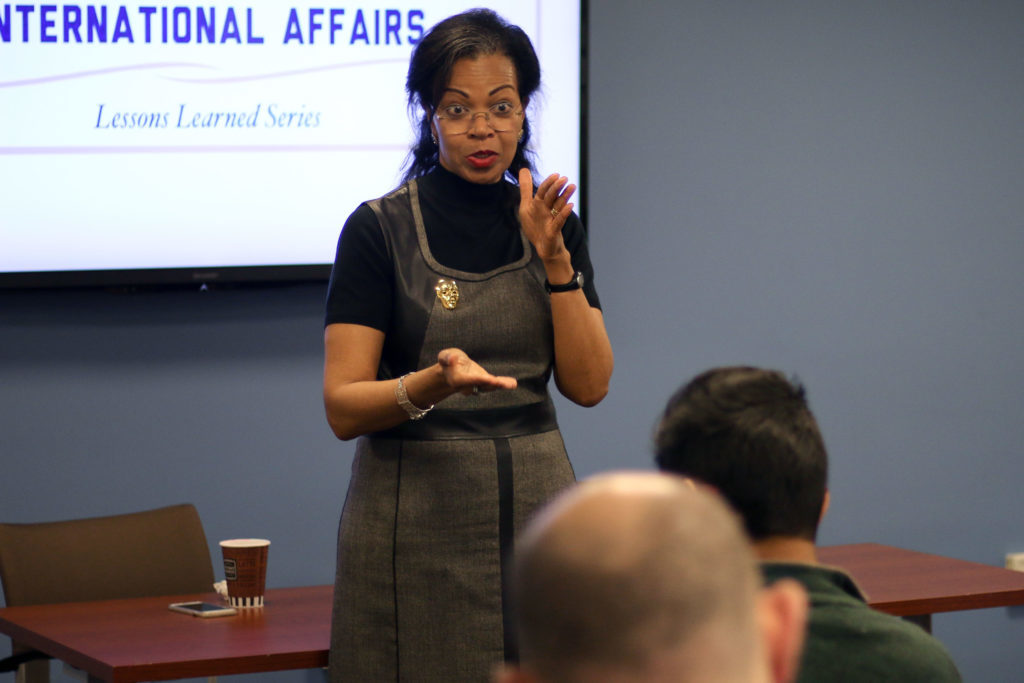A former U.S. ambassador spoke about the ethical challenges of serving in the U.S. Foreign Service at the Elliott School of International Affairs Tuesday.
Gina Abercrombie-Winstanley, who is also a GW alumna, served as the U.S. Ambassador to Malta from 2012 to 2016. The event was hosted by the Elliott School’s new Leadership, Ethics and Practice Initiative, which delves into issues of ethics on an international level.
During her time with the foreign service, Abercrombie-Winstanley was stationed at posts in Iraq, Indonesia, Egypt and Israel. She later served as Consul General in Saudi Arabia, before her appointment as ambassador during the former President Barack Obama’s administration. She shared stories from her experiences abroad with students in the Elliott School.
Here are some highlights from the event:
1. Ethical decision-making
Abercrombie-Winstanley discussed five anecdotes from her career when ethics played a big role in her decision-making process, ranging from rules regarding expensive gifts to reporting affairs between an ambassador and one of his subordinates.
But she said the toughest call to make was when her regional security officer suggested that staff and workers coming from Jordan, Pakistan, India and the Philippines not be allowed to come into the building without first passing through a metal detector.
Abercrombie-Winstanley said she was hesitant to divide the consulate staff because Americans wouldn’t have to go through the same security checks.
“The local staff, most of them had been with the consulate for 20, 30 years,” she said. “All of us were under threat. All of us were in danger as we came through that gate.”
To solve the dilemma, Abercrombie-Winstanley said she came up with a compromise that everyone would walk through the metal detector.
2. Handling an attack on the U.S. Consulate General
Islamist militants attacked the U.S. Consulate General in Jeddah in 2004, killing nine people during Abercrombie-Winstanley’s tenure as the Consul General. She said she faced many challenges as a leader both during and after the attack.
During the four hours the consulate was under attack, Abercrombie-Winstanley said her priorities were to account for staff and try to get help from Saudi officials. Despite sharing a wall with the Saudi National Guard, she said it took security forces an “inordinate” amount of time to arrive at the consulate to deal with the situation.
“The worst part of that day was then going to the widows and extending condolences. And, of course, I had to do it,” she said. “The ambassador went with me for a couple, but most of them I did on my own.”
3. Sexual harassment in the field of diplomacy
The former ambassador also spoke about her personal experiences with sexual assault and harassment during her long career in the foreign service.
She discussed how it can feel “demoralizing” when someone in power makes advances and the intense psychological impact that sexual harassment can have on a person’s self-confidence.
She talked about harassment she faced during a trip to Ireland when she was serving as the Director for Legislative Affairs at the National Security Council.
“It was the head of the delegation that I was talking about the peace process with,” she said. “We’d agreed to have dinner and, in short, he’s trying to kiss me.”
Abercrombie-Winstanley said it was during this time that the Monica Lewinsky scandal was all over the news and she was among a generation of women who still felt like they were living in a “man’s world.”
“It didn’t occur to me to accept or do anything I didn’t want to do, but it also didn’t occur to me to tell someone looking for redress,” she said. “I did not think that was possible.”





